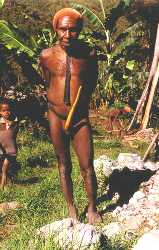
My dear readers,
It has become more and more difficult for me to adjust to settled life after the
nomadic life of a traveler. Travel is addictive! I survive only with help of my
non-prescription medicine, which I take on a daily basis: seventeen table spoons, at bed
time with food. What medicine, you may ask? Here is the chemical formula of
it: 40% solution of C2H5-OH in H2O.
Yesterday a courier company called me and offered a last minute special courier trip to Bangkok for FREE. It will be month long trip. I do not plan to spend much time in Bangkok. I will go to Indonesia and will try to reach Indonesian province Jrian Jaya, on eastern part of New Guinea Island, next to Papua, New Guinea. The cannibals who live there, wear simple two pieces suits, consisting from tie and gourd, see attachment. I would love to send you my picture in such suit on bicycle.
I will fly at noon from JFK
Alex Mumzhiu
New York
7 am Nov 24 2004
Hello everybody,
According to your responses some of my readers still do not understand seriousness of decease called travel addiction. If you are one of them please take a look at interview with the best traveler of the year Hiromaca Ando. This Japanese man traveled across entire Russia on bike in winter: http://www.utro.ru/articles/2004/02/13/278672.shtml Full text is in attachment
CURRIER BUSINESS
The courier business is a funny business. They give you directions on how to navigate through the airport, where to meet their representative and what to do next. It is similar to the popular TV game "Amazing Race."
To make this game more interesting they put in their instruction some necessary and also some unnecessary steps and provide erroneous maps and incorrect sketches. It is always in rush, because their reps are always late. In Narita airport I was supposed to meet the courier rep. Map, they provided was wrong. My plane from NY to Narita was late. So after I gave the rep baggage invoices, I had to rush to the plane to Bangkok. Instruction manual told me to obtain Value Added Tax certificate. I do not think I need it, but instruction put it in BOLD. Eventually I found proper place in Japanese language only Narita airport and they told me that I do not need this certificate. I rushed through immigration and customs and jumped in my plane in the last minute, like in the above mentioned TV show. Will you get upset and angry by such situation or will you enjoy it depends on your mental state. I decided to enjoy the situation and considered it a TV game.
I learned awhile ago how turn a bad situations into enjoyable one by manipulating my mental state. Once I was stuck in traffic in car at hot sunny day. Air conditioner was not powerful enough to cool the car. And I think: "the car became like sauna". When I start to think why people hate when car became like sauna, but the same people enjoy extreme hot in real sauna. The only difference is in their mental state, I concluded. So I decided what I will think of hot car as of sauna. I switched air conditioner OFF. Switched high heat ON and closed the windows. It is became very hot in a car like in good sauna. I removed shirt and pants, stay in boxers and imagined that I am in sauna. Immediately everything changed and instead of suffering I started to enjoy that extreme heat.
Alex Mumzhiu
Bangkok Thailand
Dec 4 2004 10am
Attachment:
Interview with the best traveler of the year in Russian(Cyrillic windows). Unfortunately I do not have it in English
ЯПОНСКИЙ ВЕЛОСИПЕДИСТ ПРИЗНАН ПУТЕШЕСТВЕННИКОМ ГОДА
Престижная награда ПУТЕШЕСТВЕННИК ГОДА присуждена в Японии 34-летнему Хиромаса Андо, который впервые в мире проехал на велосипеде, в том числе и зимой, через всю Россию - от Мурманска до Магадана.
Путешествие от Баренцева до Охотского моря на
двухколесной машине заняло у работника фирмы,
торгующей компьютерами, восемь месяцев - с 1
сентября 2002 до 7 мая 2003 года. Счетчик его
велосипеда
отмерил 15 тыс. км российских дорог и бездорожья,
включая и трассу по льду Байкала. Характерно, что
Андо не прекращал свое путешествие даже в
суровые зимние дни, когда столбик термометра
опускался ниже -40°С.
Хиромаса Андо - путешественник опытный, странствовать он начал с 1991 года. Тогда японец объехал Россию на поезде, но ему этого было мало. Прежде чем отважиться на экстремальный тур по России, японец побывал на Аляске, в Индии, странах ЗОЛОТОГО ТРЕУГОЛЬНИКА.
Интересно, что когда по прибытии в Магадан Андо спросили, не скучает ли он по семье (жена и малолетняя дочь), тот ответил, что вовсе нет. А вопрос о том, как к его увлечению относится супруга, вообще поставил Андо в тупик. Хиромаса ответил, что он ее не спрашивал, но думает, она понимает его.
I have to upset you my dear readers. When I came to Bangkok I realized that I do not have enough time to visit Irian Jaya, so I will not be able to sent you my picture in a cannibal's costume. Keeping in mind the time constraints I have to set for a less ambitious goal. I always wanted to visit uninhabited island. You know, that type of island about which we read the books in childhood. It should be covered with tropical forest and surrounded by tropical sea full of mysterious and dangerous creatures. I went unprepared, so I had to do my research after my travel started. Unfortunately most uninhabited islands now are covered with all-inclusive 5 star resorts. However, I found something which supposed to be close to my dream. It was small island Ko Wai located near big island Ko Chang near the Thailand border with Cambodia. I came to the island in the evening November 30 by once in the day ferry with 3 other tourists. It is two "resorts" on the Northern part of island. I stay in "Paradise Resort" for $5 per night. Southern part of island is uninhabited, as I learned it next day and it was really close to my dream.
The island is small and it can be circled by swimming. This is what I did, one day swimming clockwise the other day counter clockwise around the island. I started to swim right from my bungalow, which you can see in attachment. I took with me a knife, a lighter in plastic bag, bottle of water and my large stainless steel mug for making fish soup. And of course mask, fins and shorkel. This time I took with me a folding sling, a sort of primitive underwater gun, actually a stick with piece of ribbon attached to one end and three prong spear to the other end. Sea floor is incredibly beautiful here, many corals, mostly young, different shapes and colors, sea urchins sitting on the bottom as an out of space ships with their bright navigation lights (eyes) arranged in sophisticated geometrical pattern on their back, and many tridaknas. Tridaknas bury themselves in the ocean floor so they cannot be removed easily. They keep halves of their shells open and you can see the incredibly bright colored mantle, emerald green, deep blue, bright red, all possible and impossible colors.
Southern shore of the island is uninhabited except for two half abandoned fisherman bungalows. It is mostly rocky shore with few small bays surrounded by picturious rocks and it has several mysterious caves with pirates' gold. Top of the rocks covered by tropical forest, sometimes going down to the water. I started my swim in the sunrise and returned in the evening. All my body get covered with small wounds and sores from sea urchin needles, from fairy corals, from stinging micro organisms floating in the sea and from sunburns. I did not take any food with me. I eat the sea shells raw. It taste like sushi. Next time I will take a soy sauce. I also killed few small fish and make fish soup. I made a fire and boiled them in a sea water. Soup became too salty, but fish was OK. For desert I had a wild pineapples growing on the shore.
Once I did really stupid thing. I found unattached tridakna. I read these stories about divers who's hand or foot was jammed by gigantic tridaknas. So I tried to see how this tridakna will react. I put something inside tridakna. It did not really react. Then I put the fingers of my two hands inside and try to open it. Instantly my fingers were jammed with incredible force, like in wise. I pulled them out, but sharp edges of shell made two deep cuts on my thumbs. I took tridakna to the shore and broke it with stone. I still wanted to see what is inside. It was big and thick closing mussel there, like scallop's mussel, but much bigger. It taste also like scallops.
After two days of swimming my back was in fire from sunburns and I definitely cannot swim anymore. So next day I left in the morning for the big island of Ko Chang, with intention to cross it on bike and to take a ferry to the mainland from the opposite side of the island. Road was steep and sun was very hot. I protected my body and head but my legs burned during two days of swimming were unprotected. It was impossible to put on long pants in such hot. So, I remembered what Indian yogs do. They cover their body in ashes. It was no ashes there. So I covered my legs with road dust, it helped. Now I know why yogs do it. It is just kind of sunscreen for them. The same day I returned to Bangkok and tomorrow morning (Dec 5) I will fly to Burma.
| 1. My bungalow at Paradise resort | 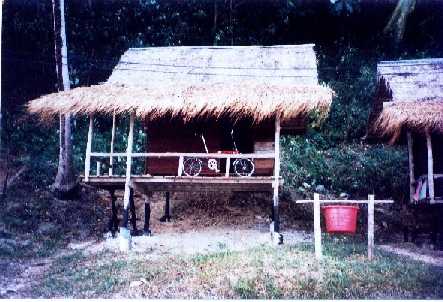 |
| 2. Paradise Resort at Ko Wai | 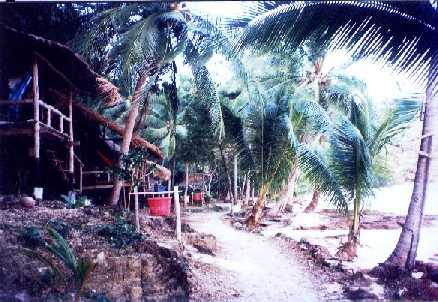 |
| 3. Collecting the natural kauchuk is another business of Ko Wai | 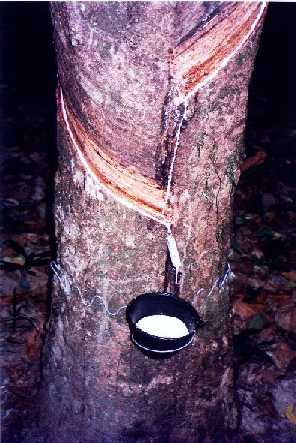 |
| 4. On the road of Ko Chang | 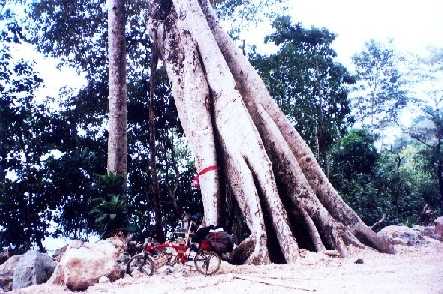 |
Alex Mumzhiu
Bangkok, Thailand
Dec 4, 2004, 7pm
My dear readers,
I went through last portion of my trip on pretty tough schedule because I wanted to visit several places which were on my back burner for a long time. I slept on the buses while riding from one destination to other. This is why I did not responded to your E-Mails. However I have three travel notes ready in my mind and even partially written.
When I came to USA, I have got sucked into the mess caused by overwhelming amount of travelers before the Christmas day, airlines computer crush and bad weather; and I stand entire night in line for the bus from NY to Wash.
After I came home the dramatic event happened. The tsunami hits the most of places I visited in SE Asia. Place which I admire most Ko Phi Phi Island was washed away.
Soon I will sent you my notes as they were written before the disastrous tidal wave stroke, even it may looks irrelevant by now.
Alex Mumzhiu
McLean Va USA
Dec 27 2004 3am
Ten years ago about this time I visited Thailand for the first time. One thing which impressed me the most was Phang Nga Bay. This bay is full of small islands with vertical walls. One of them is famous James Bond Island, filmed in the movie "The Man With The Golden Gun", see an attachment. Another island, Ko Panyi, is empty inside. It was discovered recently from the airplane. The curvy channel leeds from the outside sea into the laguna of the lost world inside the island. The ceiling of the channel is so low that tourists in kayaks have to lay down on the kayak's floor to get through.
I was in Phang Nga bay on a boat tour from Phuket. It was like most tours, short and rushed, look at left look at right...
But this place impressed me so much that I wanted to come back. I wanted to inspect these strange places in detail on my own and understand how nature created such weird structures.
Ten years ago I was a different person. I did not know how to get there, other than by organized tour. I was not sure how to find public buses to Phang Nga, if they exist? How to find a hotel? What will I do if it is full? Ten years ago I was like many of you my dear readers.
Now, ten years later, armed with all my experience of independent traveling, I decided to investigate Phang Nga and Ko Phi Phi (another similar place nearby) on my own.
I arrived at Bangkok airport from Burma (TN on Burma will be sent later) on the
afternoon of Dec 13 and took an overnight bus to the town of Krabi on the shore of Andaman
sea. From Krabi I took a boat and arrive at Phi Phi Island about noon of Dec 14. The Phi
Phi Island was very popular tourist destination and all places near the shore were taken.
I found a room in a small hostel across from the Rock Backpacker Hostel in the Tourist
Village located about 500 meters
from the shore.
Next day I took a tour around Koh Phi Phi Don island and nearby Koh Phi Phi Leh Island. A fleet of about dozen and a half small boat and several large boats sail around two islands and stop at most interesting places, like Maya Bay, filmed in the movie "The Beach". The places we visited, were amazing, but going through them with the hordes of tourists was not the way I wanted to see them.
So, the next day I decided to swim around the smallest (Western) portion of Koh Phi Phi
Don. My route shown in red on map in attachment. After the fleet of boats with
tourists passed in the afternoon, I was left alone with the sea and the vertical walls of
the island. These walls were mostly not even vertical, but with some negative angle,
because the sea dissolved limestone material from which they were made. The most amazing
features of seashore landscape here are stalactites hanging from the island's walls above
the sea, see attachment. Unlike stalactites inside the caves, which are nice
and sleek, these stalactites are are ugly and weird. They remind the bodies and body
parts of sinners hanging from the ceiling of Buddhist hell, according to pictures in
Tibet. Impenetrable walls were broken sometimes with small grottoes and submerged and half
submerged caves to which I dive. And it was a lot of sea animals there. I killed a large
cuttlefish with my underwater sling and planned to boil it in next bay with some
wood. But accidentally I slipped my bag and it fell to the ocean floor, along with my
knife, lighter, steel mag and water bottle. But I missed mostly the cuttlefish, it was so
colorful and I wanted to examine it in details. I did not meet any swimmers
and only when I approach the end of my trip I met few kayakers. I swam for nine
hours and when I came to my hotel I barely stand. But I was happy, it was exactly the type
of interaction with the Andaman sea which I dream about.
Next day I took a boat to Phuket. I learned from the Lonely Planet book
"Thailand's Islands and Beaches" that I cannot investigate Phang Nga Bay on my
own. Islands are far away from the mainland and from each other for swimming. Also water
is not clear here, so snorkeling will be not fun. Nobody rents kayaks at Phang Nga. So I
took a boat tour like ten years ago. Nature create here even more weird karst phenomenons,
then in Phi Phi. That empty island, is the most
amazing. Sea water dissolved its middle part. Unique flora and fauna had been grown
inside, behind the tall island's walls in the space which was completely isolated from the
outside world. From Phang Nga I took the bus to Khao Lak on Dec 18.
Postscript
Eight days later tsunami hits these places which I just visited and names like Phuket, Koh Phi Phi and Khao Lak were frequently mentioned in the news. Koh Phi Phi island is made of two hilly parts connected with sandy isthmus, which is barely above the sea level. The most narrow part of it is about 200 meters wide. Tsunami which hits directly from the South should washed away everything from the isthmus to the Northern bay. My hostel was 500 meters from the sea in the Tourist village, but even there water reached the second floor. According to the news all houses on Koh Phi Phi was destroyed. In Phuket I lived just across from the main street, I even remember some store's sign boards which now are shown in the news. This street was shown on TV many times with the mountains of cars, boats and garbage in the middle.
I wanted to stay in Thailand till New Year but my daughter wanted me to came back before Dec 25. My son who is now in his round-the-world trip also supposed to be in Thailand about this time, but he fell in love with Africa and postponed his departure from it. So both of us just accidentally were not there in the time of tsunami.
Attachments:
| 1. James Bond Island |  |
| 2. The Ko Phi Phi Don Island at North. The Ko Phi Phi Lex (uninhabited) at South. Tsunami came from the South and hits Ko Phi Phi Don from the shallow Ton Sai Bay, which is the worst case scenario. Tsunami release its energy when its coming to shallow shores and it may be harmless near the deep vertical walls | 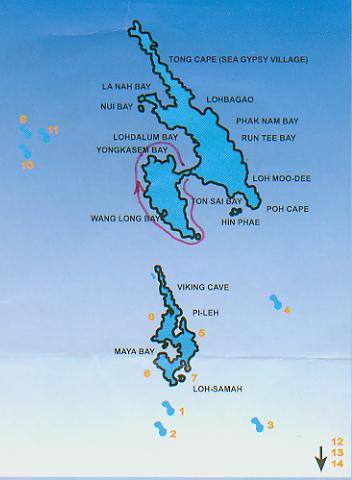 |
| 3. Stalactites Of Phang Nda Bay | 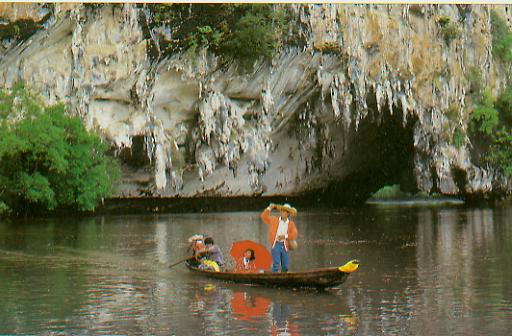 |
| 4. More stalactites | 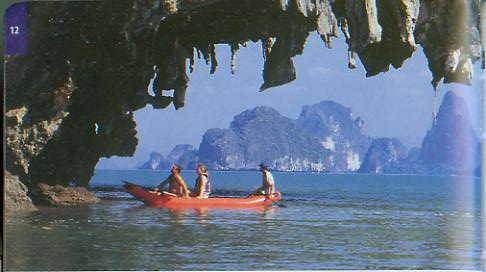 |
Alex Mumzhiu
Washington USA
Jan 4 2005
After I returned from Phang Nga Bay, I took the bus to the Khao Lak, 60 mi North from Phuket along the Andaman Sea. I arrived at Khao Lak at 7pm, Dec 18. Khao Lak is very new resort and it is even not shown on the most of maps. It has been grown very fast because of its proximity to Similan Islands, a popular diving destination. It has dozens of diving shops. At 7 pm most of diving shops had nothing left for the next day. I barely found one with space. I took two days and one night sleep-on-boat tour.
Diving at Similan Islands did not impress me very much. The dives were OK, but not as outstanding, as I expected. Similan Islands have different sites and those which we visited were probably not the best.
On the second day of diving I had a diving accident, which I would like to describe in detail because I have several divers on my list and I hope my experience will be useful to them.
I run out of air at 37 meters below. This is how it happened: My secondary air hose was leaking periodically, but pressure in my tank was OK. After its drops from initial 250psi to 100 psi, it stay at 100 psi and I was happy. Than, at one moment I feel difficulty breathing. I take a look on my pressure gage, it was 100 psi, so it was nothing to worry about. It was probably something intermittent with my regulator, I thought. And I continue to swim. Then few moments later the airflow stopped. I could not inhale the air anymore. It was at 37 meters below the ocean surface. My only option was to go straight up to the surface, I thought. It is very dangerous I knew. The lung can explode or blood can virtually boil and bubble of air can get into the brain or heart.
But before going straight up, I decided to inform my scuba instructor. I swam to her and grabbed her fin. It looked like pretty frivolous action, and she react accordingly, she continue to swim. When, with the last drops of oxygen I caught up with her and showed her that I will go up,... straight. I forget the diver's sign "out of air". In no rush she take a look on my pressure gage, it still shows 100 psi, than she tried my mouth piece and found no air in it. And only than, she gave me her secondary air-hose. By that time I was in a desperate need of air. Then, we went together to the surface with all necessary decompression stops. She had enough air in her tank.
Analyzing this incident I came to conclusion that my recent experience of long solo snorkeling was counterproductive, ironically, because it taught me to rely only on myself. When airflow stopped, I reacted automatically as if I was still snorkeling alone. I completely forget that just for such occasion every diver has an axillary air hose, to give it to the partner who needs air. However while my motivations were wrong, my actions fortunately were right.
Also it is became clear that it is not a good idea to dive with the company which has plenty of spaces, while others are full. Leaking air hoses and defective pressure gages simply should not be present at the diving boat.
Postscript:
Six days later tsunami hits the Khao Lak. According to CNN, the Khao Lak has largest number of victims in Thailand, mostly the Europeans and mostly Swedes. And it was mostly family, not backpackers type people there, as I observed. It was large number of victims in Khao Lak because many resorts, mostly upscale ones, were build almost at the water level at the Khao Lak shore.
Alex Mumzhiu
Washington USA
Jan 7 2004
People in Myanmar (formerly Burma) still wear traditional "longui" even as its neighbors abandon their sari and sarong for Levis and miniskirts. You can't buy a McWhopper or use a cell phone or even check your email here. In stretches of the countryside, rice paddies are farmed by water buffalo, people move by ox cart and there's no trace of manufactured goods. All of this BECAUSE, the Myanmar was virtually sealed off from the outside world in 1962 when a military regime took control of the government.
I know that some of my readers will not be happy to read the above statement, which sound like praising the military regime. But this is not mine, this is a quotation from the Lonely Planet "Southeast Asia on a shoestring" 12 edition, page 506. Mine is only "BECAUSE".
I would like to add to the Lonely Planet, that there are no McDonalds, Pizza Huts, Burger Kings, Holiday Inns, Ramada Inns, Citibanks and Ben and Jerries which covered the rest of the globe like mushrooms after the rain. Again, I do not want to praise the military junta, and the above mentioned phenomenons are rather the side effects, than direct intentions of the junta.
I arrived in Yangon (Rangun) Dec 5 from Bangkok. Price of round trip ticket + visa was $160+$30. At first, the county surprised me by very low charge for the taxi from the airport to the town (about 45 minutes ride) cost only $3. But later I learned that everything else is also cheap. On every corner they have outdoor cafes, so to say (see attachment), where you can drink green tea and milk tea. I was thirsty and I drank couple teapots of green tea and several cups of very tasty milk tea and couple of cookies. And because I did not know the price, I offered the banknote of large denomination, about $0.50. They gave me $0.30 in change.
These outdoor cafes are so much fun. You are sitting surrounded by people of different religions and ethnic groups, all wearing their distinct uniforms. It is like being in a masquerade ball. The Muslims of different denominations are distinguished by the color of their skullcaps. The Buddhist monks wear orange robes. And there are all sorts of minorities, Mon, Chin, Kayah, Achin, Shan, Kayin and so on. You may create a word from three or four letters and it will be the name of Burmese minority.
Unlike many other places in the world, I did not notice any hostility between them. It was like in the Biblical Eden, where all sorts of animals live peacefully together. It was probably the side effect of military dictatorship. In dictatorial states people are united against oppressive government and do not have energy left to fight each other. Also, like in former Soviet Union, the government probably suppress uncontrolled nationalistic sentiments.
In this sense the freedom and democracy bring a lot of problems along with them. You may recollect what happened with former Yugoslavia after bloody dictator Tito died. Unfortunately first purpose the people use freedom for, is to get to each other throat.
It is different sort of outdoor cafes in Rangoon. In one of them, populated mostly by Muslims they drink some kind of white liquid. I ordered that (I did know what), it was kind of yogurt.
People are extremely friendly to foreigners, like nowhere else. They greet you and ask questions. This is genuine interest, they do not try to sell you something after. It is similar to what used to be in the Soviet Union, where people expressed genuine interest and sympathy to these brave foreigners who broke through the iron curtain.
Except for Rangoon I visited Mandalay and Bagan, a must to visit places on every Burma visitor's list.
This story happened to me again and again. When I visit these famous (recommended) places especially with good tourist infrastructure, handicap access, information kiosks and stuff like this, I cannot get rid of feeling that it is purposely made for sale to ME, a tourist.
In this sense I like more the places which are not made for tourists, the places where the local people live their natural life and do not care about tourists. For me, the more interesting activity is to get submerged in the life of local people and get at least some feeling of it.
In this sense I like Rangoon much more than Bagan and Mandalay.
People on vacation, having little time, want to squeeze as many recommended objects as possible in their tight schedule. As a result they are coming back home having no idea about life of country they just visited. As a conclusion I would like to recommend Burma to everybody who wants to see something quite different than most of the world enthusiastically engaged in the globalization.
Attachments:
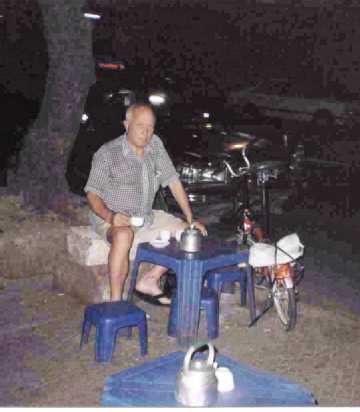
1. Alex is drinking tea at "outdoor cafe" in Rangun.

2. Gold-leafed boulder maintains its precarious balance due to a precisely placed Buddha hair.
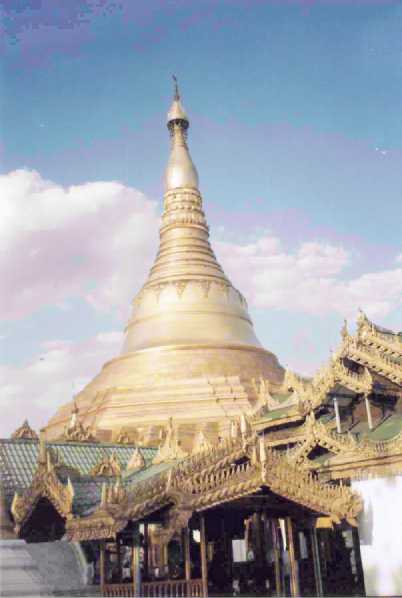
3. Shwedagon Pagoda, Rangoon.
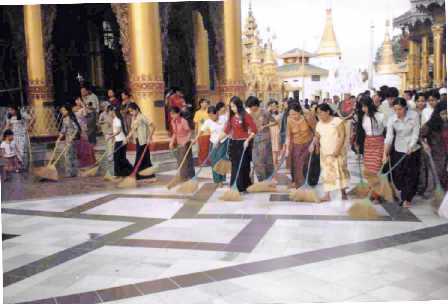
4. Volunteers sweep floor of the Shwedagon pagoda.
Alex Mumzhiu
Washington USA Jan 12 2005
My reader from St. Petersburg Olga P. asked what will happens with the diver during tsunami. Her complete letter is in the attachment.
To answer this question we have to consider the physics of tsunami. See the picture.
The tsunami travels with the speed of commercial airplane. Tsunami waves usually have period (time between two sucessional waves) in the range of 10-30 minutes. Wavelength -L (distance between two sucessional waves) is in the range of hundreds kilometers. Height -h, several meters to 30 meters. Because of long wavelength of tsunami, the ship in the middle of ocean may even do not notice tsunami.
When tsunami finally reaches the shore, it may appear as a faster then normal rising or falling tide. So during the time interval equal period/4, the sea level will rise to h/2 meters above the normal level or fell to h/2 meters below it.
Tsunami is harmless near the shore with deep vertical walls. Water level raises and falls, but because water has nowhere to go, then vertical movement of water is not get transferred into the horizontal flow.
I practically observed it at the Baja California. A very large Pacific waves were really harmless near the deep vertical walls of "Land's End" See: http://www.foldabikes.com/CurrentEvents/Story/CA.html
When tsunami reaches the shallow water or low laying shore, then huge volume of water equal (h/2 x L/2)/2 x W starts to flow on affected area. Where W is the length of affected area.
From this consideration it is became clear that the wall diving is harmless for diver. Shore diving is most dangerous. Generally, the deeper diver is - the safer he or she will be.
Below is an exert from the report on tsunami diving at Sirin Islands. It is near Similan Islands, where I dive.
"The morning of the 26th we were on a dive and at about 30 feet deep when a strong
current appeared. Sherry was about ten feet from me and I was suddenly spun around and was
beginning to be sucked down. Sherry was being pulled up and we were able to get together
just as the current became very strong and the sand created a white out. I would guess we
were traveling about 20 mph at zero visibility. We kept an eye on our depth gage and were
able to maintain our depth at about 30 feet. We surfaced after about ten minutes and found
ourselves in very angry water that was boiling and whirl pooling. We were fairly close to
shore, but decided to kick away so the boat could see us and could pick us up. After about
ten minutes the boat found us and picked us up. We were diving with nine other people and
were all spread out over about a mile. Everyone surfaced and everyone was okay. The
captain said the water rose about 30 feet instantly.
We spent the next two night floating at sea before it was safe for us to come ashore.
On the trip in, the reality of what had happened would set in. We saw numerous bodies floating and the Navy was out trying to pick them all up. Upon reaching the marina, we saw the total destruction of the tsunami. All the buildings had been completely destroyed and we passed many trucks full of bodies on the way back to our resort."
Full text is published at: http://www.scubaaddict.com/modules/news/article.php?storyid=45
Attachments:
1. Letter from Olga P.
Hello Alex,
I've just read your last travel message, and one question came into my brain. I do understand the question is a sort of silly and cynical, but... anyway. Did divers have more possibilities to survive during tsunami than others? I mean, if they had been under the water when the disaster happened, and they had have a plenty of air... I suppose you understand my question.
And the same concerns diving ships in the open ocean. I remember, ancient Japanese would always went into open sea to avoid the tsunami, because the wave is not so dangerous for ships.
Well, I could try to find the answers by my own. I assume there are a lot of very detailed pieces of information on the Internet, on TV, on radio channels, or somewhere else. But I ask you. I just cannot find it by myself.
To be honest, I (and a lot of other Russians) are really full up with terrible news that went up in our society during the last year. And we just cannot receive it anymore, it seems impossible for human beings. Yes, I know, we must, because nothing are going to change if we live without the knowledge. But let us take a short break for a while, just a short break...
Apparently, the break has been over, that is why I ask you.
Thanks a lot.
P.S. Sorry for writing in English, I just suddenly forgot I can use Russian.
Schastlivo! Olga
2. Illustration picture on tsunami.
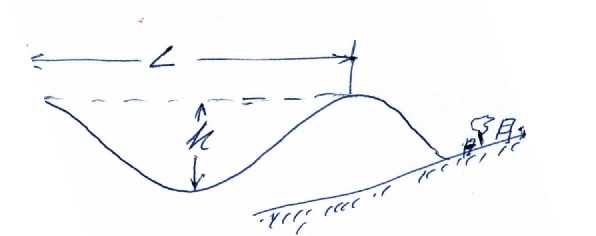
Alex Mumzhiu
Washington USA
Jan 12 2005
Browsing the Internet I discovered at one Russian site, that I am not a Georgian, but an African American and also grandfather. See attached quotation below. Another mentioned person is hithhacker Grigorii Lapshin, I know him.
Alex
Сейчас вместе с отцом бродили по сетевым запискам эквадорских путешественников. Вроде весёлого дедушки Мумжиа (это не грузин, а американский негр), прошедшего 95 стран, или безбашенного нашего соотечественнка, легко находящего общий язык с местными при помощи русского, жестов и отдельного вкрапления английских и испанских слов. Автостопом по латинсокй америке. пешком через Анды. Сердце тихо запело-заныло... Путешествия - лучшее, что может быть в моей жизни.
Full text is at: http://search.rambler.ru/srch?words=%EC%F3%EC%E6%E8%F3&hilite=DC2C2BE4
Alex Mumzhiu